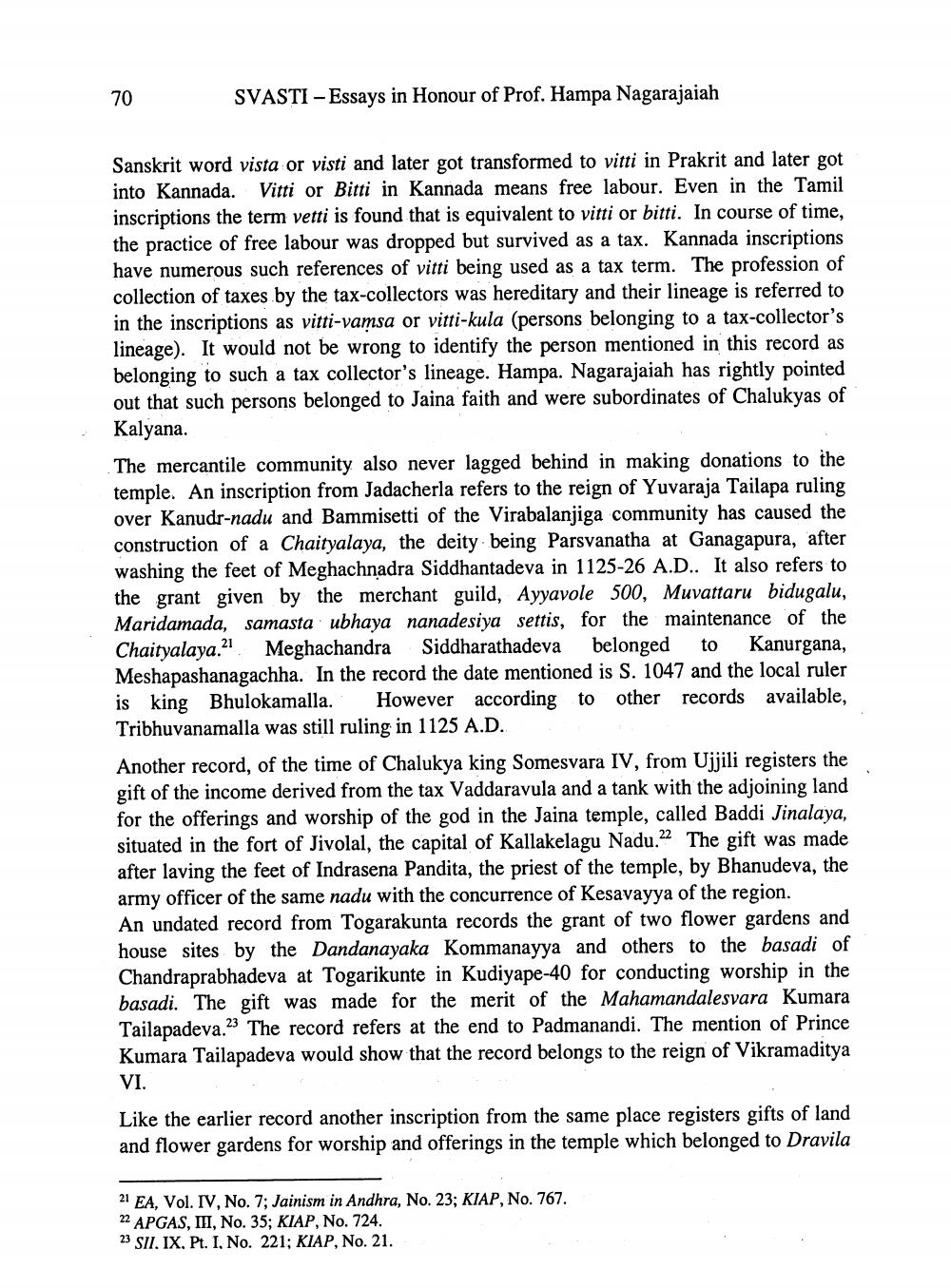________________
SVASTI - Essays in Honour of Prof. Hampa Nagarajaiah
Sanskrit word vista or visti and later got transformed to vitti in Prakrit and later got into Kannada. Vitti or Bitti in Kannada means free labour. Even in the Tamil inscriptions the term vetti is found that is equivalent to vitti or bitti. In course of time, the practice of free labour was dropped but survived as a tax. Kannada inscriptions have numerous such references of vitti being used as a tax term. The profession of collection of taxes by the tax-collectors was hereditary and their lineage is referred to in the inscriptions as vitti-vamsa or vitti-kula (persons belonging to a tax-collector's lineage). It would not be wrong to identify the person mentioned in this record as belonging to such a tax collector's lineage. Hampa. Nagarajaiah has rightly pointed out that such persons belonged to Jaina faith and were subordinates of Chalukyas of Kalyana. The mercantile community also never lagged behind in making donations to the temple. An inscription from Jadacherla refers to the reign of Yuvaraja Tailapa ruling over Kanudr-nadu and Bammisetti of the Virabalanjiga community has caused the construction of a Chaityalaya, the deity being Parsvanatha at Ganagapura, after washing the feet of Meghachnadra Siddhantadeva in 1125-26 A.D.. It also refers to the grant given by the merchant guild, Ayyavole 500, Muvattaru bidugalu, Maridamada, samasta ubhaya nanadesiya settis, for the maintenance of the Chaityalaya.21 Meghachandra Siddharathadeva belonged to Kanurgana, Meshapashanagachha. In the record the date mentioned is S. 1047 and the local ruler is king Bhulokamalla. However according to other records available, Tribhuvanamalla was still ruling in 1125 A.D. Another record, of the time of Chalukya king Somesvara IV, from Ujjili registers the gift of the income derived from the tax Vaddaravula and a tank with the adjoining land for the offerings and worship of the god in the Jaina temple, called Baddi Jinalaya, situated in the fort of Jivolal, the capital of Kallakelagu Nadu.22 The gift was made after laving the feet of Indrasena Pandita, the priest of the temple, by Bhanudeva, the army officer of the same nadu with the concurrence of Kesavayya of the region. An undated record from Togarakunta records the grant of two flower gardens and house sites by the Dandanayaka Kommanayya and others to the basadi of Chandraprabhadeva at Togarikunte in Kudiyape-40 for conducting worship in the basadi. The gift was made for the merit of the Mahamandalesvara Kumara Tailapadeva.23 The record refers at the end to Padmanandi. The mention of Prince Kumara Tailapadeva would show that the record belongs to the reign of Vikramaditya VI.
Like the earlier record another inscription from the same place registers gifts of land and flower gardens for worship and offerings in the temple which belonged to Dravila
21 EA, Vol. IV, No. 7; Jainism in Andhra, No. 23; KIAP, No. 767. 22 APGAS, IH, No. 35; KIAP, No. 724. 23 SII, IX, Pt. I, No. 221; KIAP, No. 21.




